The AI Grapple
Unravel the complexities of AI with The AI Grapple Podcast, hosted by Kate vanderVoort. Dive into thought-provoking discussions on the most critical AI issues shaping our world. Perfect for marketers and business professionals, this podcast is your guide to integrating AI responsibly and ethically into your organization. Join us as we navigate the future of technology and its profound impact on humanity.
Episodes
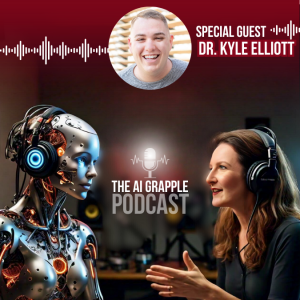
Wednesday May 14, 2025
Wednesday May 14, 2025
In this episode of The AI Grapple, Kate vanderVoort is joined by Dr Kyle Elliott, a career coach to tech executives and founder of CaffeinatedKyle.com. From humble beginnings offering £5 CV reviews on Fiverr to coaching leaders into top roles at Meta, Google and Amazon, Kyle shares what’s really happening in the job market - and how AI is shifting everything from CVs to C-suite expectations.
Whether you’re a job seeker, business leader or simply watching the AI wave roll in, this episode delivers grounded, practical advice to help you stay relevant, empowered and ahead of the curve.
What We Cover:
👉 Why middle management is most at risk - and what to do about it Kyle shares what he's seeing across his client base: mid-level roles are often being consolidated or automated. It’s not about roles disappearing completely, but shifting into jobs that involve managing AI-powered processes instead of performing tasks manually. He explains how professionals can identify emerging opportunities and pivot early.
👉 The AI tools job seekers should be using now (and how to train them) AI isn’t magic - it only knows what you give it. Kyle explains how his clients use tools like ChatGPT to write CVs, simulate interviews and even explore new career paths. But success depends on input: the better the data you provide (like performance reviews or personal profiles), the better the output AI delivers.
👉 How AI is changing executive-level hiring and job strategy Even at the top, AI is having an impact. Kyle explains how senior leaders are being assessed differently, what they’re worried about, and how they're learning to talk about AI in ways that show leadership, not fear. It’s about knowing when to use AI - and when to lean on your human skills.
👉 The emotional side of job searching in the age of automation Being made redundant or feeling threatened by change brings real emotional challenges. Kyle talks about the role of mindset coaching and shares an example of a custom GPT built to motivate and coach a client through job hunting - including cheering them on when things got tough.
👉 Why the best AI results come from knowing yourself better To get personalised, useful help from AI, you have to start with self-awareness. Kyle talks about the importance of building a “professional me” document - a profile of your background, skills, preferences and values - that can train AI to reflect who you really are and what you need next in your career.
🔗 Connect with Dr Kyle Elliott:
Website: CaffeinatedKyle.com
LinkedIn: Dr Kyle Elliott
👍 Like what you heard?
Subscribe to The AI Grapple on your favourite platform and leave us a rating or review. It really helps others find the show.
🎧 Listen now → www.aigrapple.com
💬 Join the conversation: AI Success Lab Facebook Group
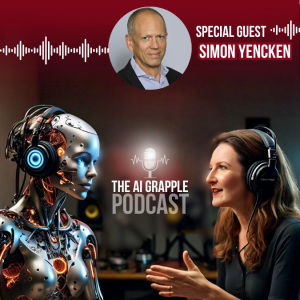
Tuesday May 06, 2025
Tuesday May 06, 2025
In this episode of The AI Grapple, Kate vanderVoort is joined by Simon Yencken, Founder and CEO of Fanplayr.
What if you could deliver hyper-personalised experiences that delight customers without creeping them out?
Simon is a true pioneer at the intersection of AI, behavioural data, and e-commerce. His career has taken him from global finance and SaaS to founding Fanplayr, a company that's helping brands deliver smarter, faster, privacy-respecting customer experiences.
We dig into how AI is reshaping e-commerce, why privacy-first strategies are critical for survival, and what the future holds for businesses brave enough to embrace the next wave of AI innovation.
If you’re in marketing, business, or tech — this is an episode you won't want to miss.
🎯 Key Highlights
✔️ Simon's Journey to Fanplayr From legal partner in Australia, to global finance at Reuters, through the dot-com boom, SaaS success stories — and finally founding Fanplayr to bring real-time optimisation to e-commerce.
✔️ What Fanplayr Actually Does
Using patented segmentation technology and AI-driven personalization to enhance customer experiences, increase conversion rates, and boost lifetime value — all built on first-party data.
✔️ The Rise of Privacy-First Personalisation Simon explains how Fanplayr helps businesses move beyond third-party cookies, using tools like Privacy ID to comply with GDPR and still deliver tailored experiences.
✔️ How AI is Revolutionising Online Merchandising Beyond basic recommendations, Fanplayr’s AI matches users with exactly what they want — even before they know they want it — using machine learning and personalisation engines.
✔️ The "Creepiness" Factor We discuss how to personalise without feeling intrusive — and why transparency and trust will define the next decade of online customer relationships.
✔️ Regional Differences: US vs Europe Simon shares why privacy regulations are tougher in Europe, and how businesses are adapting differently in the US and UK markets.
✔️ ChatGPT, Hype vs Reality Simon shares his take on large language models like ChatGPT, and why the future of AI won't be one single exponential curve — but rather a series of powerful "S-curves" as new breakthroughs emerge.
✔️ AI’s Impact on SaaS and Business Models
Why the SaaS pricing and licensing world is ripe for disruption — and how traditional tech giants will have to evolve or risk being left behind.
✔️ Avoiding the AI Bubble Simon warns about the huge number of AI startups building on shaky ground — and shares why sustainable innovation will be what separates winners from losers.
✔️ What Excites Simon About the Future AI is at the start of a genuine tech revolution — and it’s opening opportunities that are bigger and more exciting than anything since the rise of the internet.
📌 Connect with Simon Yencken:
Visit Fanplayr.com: Learn more about Simon’s company and solutions.
Connect with Fanplayr on LinkedIn
Know a someone who needs to hear this? Share this episode with a friend, team member, or mentor who’s ready to embrace AI and lead with clarity.
👍 Like what you heard?
Subscribe to The AI Grapple on your favourite platform and leave us a rating or review. It really helps others find the show.
🎧 Listen now → www.aigrapple.com
💬 Join the conversation: AI Success Lab Facebook Group
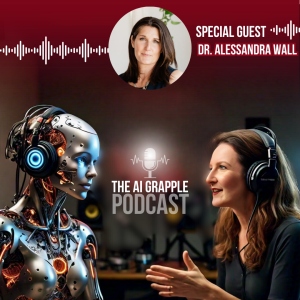
Tuesday Apr 29, 2025
Tuesday Apr 29, 2025
In this episode of The AI Grapple, Kate vanderVoort is joined by Dr Alessandra Wall - psychologist, leadership strategist, and founder of Noteworthy - to explore how AI can help women reshape their careers instead of fearing job loss. Alessandra works with high-performing women in tech who are often juggling expectations, under-recognised achievements, and the ever-growing mental load.
This conversation digs into what’s holding women back in AI and tech, the biases baked into systems, and how AI - when done right - can unlock time, ease, and leadership opportunities for women at every level.
✨ Key Highlights:
➡️ Alessandra’s career journey - from psychology to empowering women in tech Alessandra shares how growing up with ADHD shaped her drive and work ethic, and how that personal experience guided her into a career in psychology. After hitting burnout, she transitioned into coaching, now using those same therapeutic tools to support women navigating the high-stakes world of tech and leadership.
➡️ Being the only woman in the room - and why it’s still happening We unpack the systemic issues that continue to isolate women in tech and AI - from a lack of early representation to high attrition at senior levels. Alessandra shares why women are still fighting for authority, even at the top, and why the system needs more than a token fix.
➡️ Can AI reduce bias? Yes - if we train it right AI reflects the data it’s fed. Alessandra explains how recruitment tools can either reinforce bias or break it - and why the people building these systems need to prioritise diversity and allyship to get meaningful results. Garbage in, garbage out doesn’t have to be inevitable.
➡️ The invisible workload: How AI can lighten the mental load From scheduling appointments to managing family logistics, women often carry the bulk of home-life organisation. Alessandra shares how AI is already helping her - and her clients - reclaim headspace and time, freeing them up to lead more fully at work and live more fully at home.
➡️ AI isn’t just for engineers - how every woman can use it to stay competitive You don’t need a tech background to benefit from AI. Whether you’re in marketing, coaching, or finance, understanding how to use AI as a productivity and strategy tool is a major edge. Alessandra breaks down how women can upskill and support others through this transition.
➡️ Parkour and AI - yes, really! Alessandra compares learning AI to her journey into parkour at 37 - a male-dominated, intimidating space where women hesitate to jump in. Her advice? We need more women teaching women how to navigate and own these tools. The power is in mastering the basics, together.
📌 Connect with Dr Alessandra Wall:
Website: https://noteworthyinc.co
LinkedIn: Dr Alessandra Wall on LinkedIn
Know a woman who needs to hear this? Share this episode with a friend, team member, or mentor who’s ready to embrace AI and lead with clarity.
👍 Like what you heard?
Subscribe to The AI Grapple on your favourite platform and leave us a rating or review. It really helps others find the show.
🎧 Listen now → www.aigrapple.com
💬 Join the conversation: AI Success Lab Facebook Group
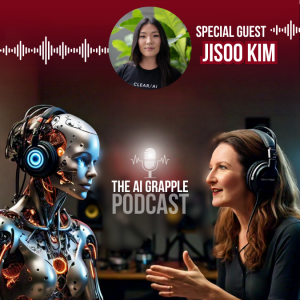
Monday Apr 14, 2025
Ep 33: Navigating AI’s Geopolitical Shifts with Jisoo Kim
Monday Apr 14, 2025
Monday Apr 14, 2025
AI is moving at breakneck speed, and nowhere is that more evident than on the global stage. The geopolitical landscape is shifting, alliances are forming, and nations are racing to lead in this transformative era. But what does it mean for Australia? And how can businesses navigate both the risks and the opportunities?
In this episode, I sit down with Jisoo Kim, Director and Co-Founder of Clear AI, to explore the human side of AI adoption, the mindset shifts organisations need to embrace, and the challenges of navigating AI’s rapid development. With a background in national security, international relations, and even a stint as a digital media adviser to former Prime Minister Scott Morrison, Jisoo brings a fascinating perspective on AI’s role in both business and global affairs.
From AI safety to the complex dynamics between the US, China, and Australia, this conversation is both timely and thought-provoking. We also dive into how organisations can overcome fear, build AI literacy, and lead with curiosity in this ever-changing landscape.
Note: AI evolves rapidly, and this discussion was accurate at the time of recording.
Key Highlights:
Jisoo’s Journey from National Security to AI Entrepreneurship Jisoo shares her fascinating career path, starting from her early interest in politics and international relations, shaped by her family's experience with the Korean War. From working as a digital media adviser to former Prime Minister Scott Morrison to serving as a policy adviser at the Department of Defence, Jisoo brings a wealth of experience to her AI advisory work. She explains how her background in national security informs her perspective on AI’s risks and opportunities.
The Human Side of AI Adoption While AI is often seen as a purely technical challenge, Jisoo emphasises that successful adoption is as much about mindset and culture as it is about technology. She discusses why curiosity, psychological safety, and executive leadership are key to overcoming fear and uncertainty. Jisoo also shares stories of organisations that have empowered employees to experiment with AI and how this approach leads to greater innovation.
The Geopolitical AI Landscape The competition between the US and China in AI development has far-reaching implications. Jisoo provides a clear breakdown of the ongoing semiconductor battle, the significance of the US Chips Act, and how Australia is positioned in this global race. She also highlights the importance of responsible AI development and the need for international cooperation — even as geopolitical tensions rise.
AI Safety and Responsible Regulation From misinformation to surveillance concerns, Jisoo dives into the complex challenges of AI safety. She discusses why regulation often lags behind the pace of technological change and why businesses can’t afford to wait for governments to set all the rules. Instead, she advocates for proactive corporate responsibility, clear internal policies, and cross-sector collaboration.
Addressing AI Fear and Misinformation Fear often prevents organisations from fully embracing AI, whether it's concerns over job loss or uncertainty about data security. Jisoo shares practical advice on how companies can approach AI adoption thoughtfully — starting small, experimenting with use cases, and ensuring employees are part of the journey. She explains why transparency and communication from leadership are critical to reducing fear and building trust.
AI in Australia and Its Role on the Global Stage Jisoo highlights Australia’s unique position as a middle power with strong alliances. She explores how Australia can not only adopt AI responsibly but also support neighbouring countries through knowledge sharing and capacity building. She stresses the importance of ensuring AI benefits are distributed equitably, particularly in developing regions.
Choosing and Using AI Tools Wisely In a landscape filled with rapidly evolving AI tools, Jisoo and Kate discuss their experiences using platforms like ChatGPT, Notebook LM, and Copilot. Jisoo shares her thoughts on how organisations can navigate the overwhelming number of options by focusing on practical, impactful use cases rather than chasing the latest shiny tool.
The Future of AI in Business and Society Looking ahead, Jisoo predicts how AI will continue to shape industries, from education and healthcare to defence and creative fields. She also shares her hopes for more collaboration, responsible innovation, and global cooperation in AI development.
This episode is packed with valuable insights for business leaders, policymakers, and anyone curious about the intersection of AI, security, and global politics.
Connect with Jisoo Kim:
LinkedIn: Jisoo Kim on LinkedIn
Website: clearai.com.au
👍 Like what you heard?
Subscribe to The AI Grapple on your favourite platform and leave us a rating or review. It really helps others find the show.
🎧 Listen now → www.aigrapple.com
💬 Join the conversation: AI Success Lab Facebook Group
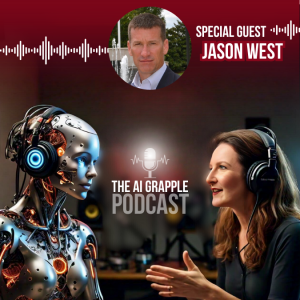
Friday Apr 11, 2025
Friday Apr 11, 2025
Today, we’re tackling the profound ethical dilemmas posed by AI in military decision-making. Kate vanderVoort sits down with Jason West, a former U.S. Marine Corps officer who retired as a Lieutenant Colonel after more than a decade of service. With first hand experience participating in AI-driven war simulations and understanding how autonomous systems could be used in modern warfare, Jason brings a unique perspective to the conversation.
Now the founder of Officers Eat Last and author of Leadership Development – A Blueprint for Building Your Leadership Foundation, Jason helps business leaders navigate ethical decision-making and responsible leadership — lessons drawn from both the battlefield and the boardroom.
From the risks of AI making life-and-death decisions to how businesses can use AI responsibly, this conversation will challenge how you think about AI, leadership, and accountability.
Tune in for a powerful discussion that will leave you thinking long after the episode ends.
Key Highlights
🔎 Jason’s Dual Career Journey
From finance to serving in the U.S. Marine Corps, Jason shares how his military background shaped his views on leadership and ethics.
Why he founded Officers Eat Last to help business leaders apply military leadership principles in the corporate world.
🤖 AI in Warfare: The Ethical Dilemma
Jason explains the concept of "human in the loop" vs. "human on the loop" decision-making and how AI is influencing military operations.
Insights from his participation in AI-driven war games, simulating futuristic combat scenarios.
The chilling possibility of AI making autonomous life-and-death decisions, and the need for robust ethical frameworks to prevent misuse.
🛡️ Maintaining Human Accountability
The risks of removing the human element from critical decision-making processes.
Jason’s belief that any AI with the potential to take lives must be governed by human oversight and clear accountability.
🏢 Responsible AI in Business
Drawing from military lessons, Jason offers guidance on how companies can integrate AI responsibly.
The importance of ethical leadership in ensuring AI serves humanity rather than replacing its moral responsibilities.
Why leaders must consider the long-term social impact of AI-driven decisions, not just immediate profitability.
🌍 Geopolitical Implications of AI
How AI is fueling a modern-day technological arms race between nations.
Jason's perspective on “peer competitors” and the role of AI in defense strategy.
The importance of international collaboration and regulation to prevent the misuse of AI in warfare.
🔔 The Path Forward
Jason’s optimism about AI’s potential when used responsibly.
Why companies should focus on upskilling their workforce rather than simply replacing jobs with AI.
The importance of governance and oversight to ensure AI remains aligned with human values.
Connect with Jason West
Website: Officers Eat Last
LinkedIn: Jason West on LinkedIn
👍 Like what you heard?
Subscribe to The AI Grapple on your favourite platform and leave us a rating or review. It really helps others find the show.
🎧 Listen now → www.aigrapple.com
💬 Join the conversation: AI Success Lab Facebook Group
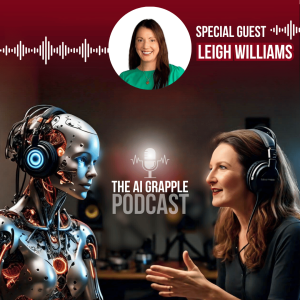
Wednesday Apr 02, 2025
Wednesday Apr 02, 2025
In this episode of The AI Grapple, Kate vanderVoort chats with Leigh Williams, Chief Information Officer at Brisbane Catholic Education, who is leading a world-first implementation of AI across a school system. With more than 13,000 staff and hundreds of locations under her care, Leigh shares how her team is bringing ethical, scalable, and deeply human-centred AI into the classroom. From cutting admin by 9 hours a week to transforming how students are supported and assessed, this is one of the most exciting real-world uses of AI we’ve seen.
Leigh’s career spans teaching, executive leadership, national advisory roles, international education, and academic research. She is also a passionate advocate for early-career women in tech and has multiple postgrad qualifications in education, business, IT and leadership.
Whether you’re in education, technology, a parent or leading digital change in any sector, this episode is packed with practical takeaways on how to roll out AI ethically, safely, and effectively – at scale.
🔑 Key Highlights
1. From Teacher to Tech Leader
Leigh shares her journey from teaching IT and biology in classrooms to leading national transformation programs and now driving digital innovation across one of the largest education systems in Queensland. Her experience across international and domestic education gives her a unique lens on what’s possible with AI in schools.
2. How AI is Saving Teachers 9 Hours a Week
Through a pilot with Microsoft Copilot, Leigh’s team measured a time saving of over nine hours per week per teacher – a full day’s work. That time is now going back into the classroom, improving teacher wellbeing and student outcomes. Leigh explains exactly how this was achieved and why it’s already attracting teachers to work at BCE.
3. Hyper-Personalised Student Learning
Leigh outlines how AI tools are being used to create tailored learning pathways for every student – adjusting literacy and numeracy content in real time based on individual performance. This goes far beyond digital textbooks, offering meaningful engagement based on each student’s interests and learning style.
4. The Rome Call for AI Ethics
Ethics isn’t an afterthought. Leigh walks us through how the Rome Call for AI Ethics, developed by the Vatican in partnership with Microsoft and IBM, provides the framework for every AI initiative BCE rolls out. This includes principles like inclusivity, impartiality and reliability – and how they’re applied practically in the school system.
5. Real-Time Assessment and Wellbeing Tracking
From progressive reporting to emotional check-ins, AI is helping identify trends in student wellbeing and engagement. Leigh shares examples of how BCE is using AI to create more dynamic, compassionate classrooms that go far beyond traditional assessment models.
6. Shifting the Conversation: From Fear to Possibility
Leigh talks about how she worked with the BCE board, staff and parents to move from caution to confidence with AI. By addressing fears head-on and sharing real data from pilots, her team created trust and momentum that made scaling AI possible.
7. What’s Next: AI, Robotics and Immersive Learning
Looking to the future, Leigh shares her excitement about the next wave – combining AI with robotics, virtual reality and augmented reality to create deeper, more immersive learning experiences. Think ancient Rome in the classroom – in 3D.
📣 Connect with Leigh
LinkedIn: https://www.linkedin.com/in/leigh-williams-profile/
👍 Like what you heard?Subscribe to The AI Grapple on your favourite platform and leave us a rating or review. It really helps others find the show.
🎧 Listen now → www.aigrapple.com 💬 Join the conversation: AI Success Lab Facebook Group
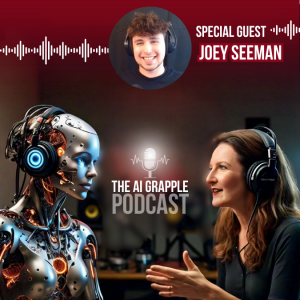
Friday Mar 28, 2025
Ep 30: Can you tell it’s a bot? Voice AI that sounds more human than humans
Friday Mar 28, 2025
Friday Mar 28, 2025
In this episode of The AI Grapple, Kate vanderVoort is joined by Joey Seeman - the young and sharp CEO of Nova Echo AI, a company making big waves in the conversational voice AI space.
Joey shares how voice AI can now make and answer calls that sound just like a human, helping businesses scale their sales and support teams with speed, consistency and personality. He also tackles the big questions - job loss, government regulation, and whether AI will eventually build itself.
Joey brings the perspective of a younger generation who’ve grown up with AI as a daily reality. While Kate doesn’t always see the tech through the same lens, the conversation is packed with thoughtful challenges, philosophical questions, and a clear look at what’s already here - and what’s coming.
If you’ve ever been stuck talking to a chatbot, worried about your job, or curious about how businesses can use voice AI today, this is a must-listen.
💡 Key topics we cover
- What makes voice AI different from chatbots?
How generative AI changed the game for customer serviceWhy Joey sees voice as the natural evolution of business communicationWhy people rarely realise they’re speaking to a bot
- Job loss or job shift?
Why Joey says his tech isn’t replacing jobs - yetThe difference between short-term efficiencies and long-term societal impactWhat happens when AI starts building AI
- Generational gaps and mindsets
How Gen Z is casually adopting AI tools without fearWhy older generations are asking the big-picture questionsJoey’s thoughts on long-term thinking, learning speed, and wisdom
- Regulation, power and responsibility
Why global consensus on AI safety may never happenHow Joey thinks governments - and Elon Musk - need to step upWhat could go wrong if humans step out of the AI development loop
- The future of voice AI
How nonprofits can reduce fundraising costs using AIWhy Joey believes voice AI will become a trillion-dollar marketWhat’s coming next - accents, faster responses, and custom featuresHow even small businesses can access the tech starting at approx. $333 per month
📣 Connect with Joey 🌐 Website: https://novaecho.ai 📸 Instagram: @joey_seeman 📸 Nova Echo AI: @nova_echoai
👍 Like what you heard? Subscribe to The AI Grapple on your favourite platform and leave us a rating or review. It really helps others find the show. 🎧 Listen now → www.aigrapple.com 💬 Join the conversation: AI Success Lab Facebook Group
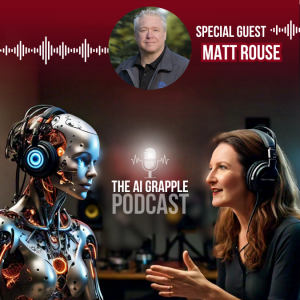
Tuesday Mar 25, 2025
Ep 29: Will AI Take My Job? Matt Rouse Explains What’s Coming Next
Tuesday Mar 25, 2025
Tuesday Mar 25, 2025
In this episode of The AI Grapple, Kate vanderVoort is joined by Matt Rouse - a tech-savvy marketer, author, and business strategist on a mission to help people and businesses thrive in an AI-driven world.
Matt shares insights from his book Will AI Take My Job? and years of hands-on experience helping companies adapt to AI tools. From job security and the impact on industries, to AI agents and the future of search, this conversation is full of practical advice, real stories, and sharp warnings.
We talk about what jobs are safe, which ones are at risk, and why the companies that embrace AI without a clear plan are likely to fall behind. If you’re in marketing, management, or running a business, this episode is packed with things you’ll want to know now - before AI makes the decisions for you.
💡 Key topics covered
- Will AI actually take our jobs?
Which roles are most at risk - and which ones are safer
Why middle-skill, process-heavy jobs are the most exposed
The hidden danger of “cascade failure” in job markets
What universal basic income could mean in an AI future
- How to protect your role or business from automation
Why every professional should be learning AI now
The power of becoming an “AI orchestrator” - even if you’re not technical
How AI can help the bottom 30% of workers perform like top-tier talent
Ways to bring AI in as a partner, not a threat
- The real state of AI inside companies
87% of companies want to use more AI - but can’t find the talent
Over half of staff already use AI - and many are hiding it
Why the C-suite may have no idea how much AI is actually being used
What boards and managers need to get right before it’s too late
- Search is changing: from SEO to AEO
How AI is reshaping the way people discover businesses
Why answer engine optimisation (AEO) is the next frontier
How Matt became the “AI Chicken Wrangler” and what it teaches us about branding for AI
Why simple, consistent messaging in the right places still wins
- AI agents, software on demand and the rocket ship problem
What semi-autonomous AI agents will do (and why they’ll annoy us first)
Why most SaaS products are at risk of being replaced
How to think about long-term value when building AI tools
The “rocket ship” challenge - what if the next version gets there before you do?
🔚 Final words from Matt
“Play with AI. Make it part of your life. Whether it’s planning meals or writing emails, the more familiar you get now, the better off you’ll be when it really matters.”
Matt’s message is simple - if you’re waiting for someone to tell you how to use AI, you’re already behind. Experimenting, learning and integrating AI into your daily work is the best insurance policy for your career and business.
📣 Connect with Matt
🌐 Website: https://matthewrouse.com 📘 LinkedIn: https://www.linkedin.com/in/mattmrouse/ 🔵 Bluesky: @authorMattRouse
👍 Like what you heard?
Subscribe to The AI Grapple on your favourite platform and leave us a rating or review. It really helps others find the show.
🎧 Listen now → www.aigrapple.com 💬 Join the conversation https://www.facebook.com/groups/aisuccessslab
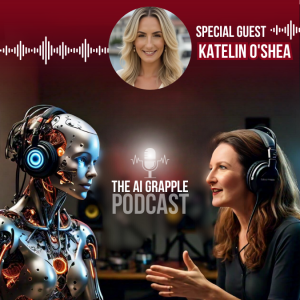
Tuesday Mar 18, 2025
Ep 28: Katelin O'Shea on Practical AI Without the Hype
Tuesday Mar 18, 2025
Tuesday Mar 18, 2025
In this episode of The AI Grapple, Kate vanderVoort sits down with Katelin O’Shea - Team Project Manager for the AI team at Dropbox Global Support, PRINCE2 Practitioner, and founder of AI That Works. With a background in operations and project delivery, Katelin brings a grounded, structured, and incredibly practical approach to AI that is accessible to absolutely everyone - no technical background required.
Her journey with AI began in 2021 with Copy.ai, using it to streamline complex grant applications. Since then, she’s experimented with everything from launching an AI-generated art store to building her own custom GPTs that automate the admin in her personal life. Along the way, she's developed a step-by-step AI implementation framework that's as effective for small businesses as it is for large enterprises.
What We Covered (and What You’ll Take Away):
💡 Start with the problem, not the toolKatelin explains how shiny object syndrome can derail AI projects before they even begin. Her advice: identify the process first, then audit for opportunities.
⚙️ Her 4-question test to decide if AI is a fitAsk yourself: Is the task repetitive? Time-consuming? Data-heavy? Frustrating? If yes, AI could help and you’ll be able to clearly measure the value.
📬 How she beat a parking ticket using ChatGPTFrom voice-to-text storytelling to a legally formatted appeal letter, Katelin used AI as her legal assistant .... and won.
🧠 AI is 70% people, 30% techYou can have the best tools in the world, but if your team doesn’t understand or trust them, it won’t stick. Katelin shares how she dedicates 30% of implementation time to building team confidence and tackling fears around job security.
📊 Messy data? Don’t let it stop youStart with a small pilot and clean only the data you need. Katelin shares how large companies can avoid paralysis and how small businesses have an edge when building from scratch.
🗣️ Why AI transparency mattersWhether it’s an AI avatar or a chatbot, Katelin believes in being upfront with customers. Hiding it erodes trust - especially when AI inevitably makes a mistake.
🧠 Is AI changing how we speak?From “navigating” to “demystifying,” Katelin questions whether AI-generated content is reshaping our language - and how that might influence communication more broadly.
📦 Custom GPTs that solve real problemsFrom her personal recipe and shopping list assistant “Susie” to writing legal letters for her mum, Katelin shares how small, tailored GPTs are her secret weapon for saving time and reducing friction.
🎨 Creativity without codingWith platforms like Replit, Cursor, and Lovable.dev, Katelin is excited about the ability to bring ideas to life without needing to be a developer. AI is lowering the barrier to innovation like never before.
🔮 What’s next in AI?For Katelin, it’s all about accessibility, empowerment, and using AI to enhance - not replace - human creativity, strategy and connection.
🔗 Connect with Katelin on LinkedIn: linkedin.com/in/katelinoshea
🎙️ Listen now on your favourite podcast platform, and don’t forget to subscribe, rate, and share this episode with a friend or colleague who’s ready to make AI actually work for them.
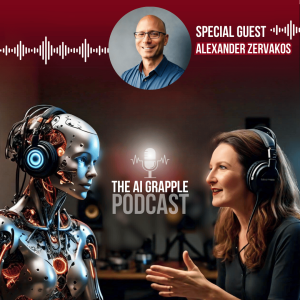
Friday Mar 14, 2025
Friday Mar 14, 2025
In this episode of The AI Grapple, Kate vanderVoort is joined by Alexander Zervakos, co-founder of Theryo – an AI-powered mental health platform transforming how therapy is experienced on both sides of the couch.
Alexander is a seasoned entrepreneur and AI specialist who previously built successful ventures in healthcare and finance. But it was his own deeply personal experience navigating therapy that became the catalyst for creating Theryo. Frustrated by a lack of structure and meaningful progress in his own sessions, Alex built a simple tool to guide his journey. That tool became the foundation for Theryo – a platform now helping mental health professionals enhance therapeutic relationships through AI-generated insights, session summaries, and care planning.
Together, we explore how AI can augment mental health care while preserving the vital human connection at its heart.
🔑 Key Highlights
💡 The Origin of Theryo
Alex’s therapy journey sparked the creation of Theryo when he saw an opportunity to bring more structure, reflection and continuity into the process.
Initially built as a personal support tool, it grew into a powerful platform that helps clients track their emotions and progress while giving therapists richer insight into the full picture between sessions.
🧠 AI as a Therapy Co-Pilot
Clients journal daily, with AI analysing entries to generate weekly summaries.
Therapists get session transcriptions, automatic notes, and cross-analysis with the client’s journal, enabling a more prepared, personalised, and productive session.
🔐 Data Privacy & Ethical AI
Theryo is built with strict privacy protocols: encrypted data at rest and in transit, de-identified records, and limited access.
Alex emphasises the importance of using platforms with robust safety protocols and professional oversight, likening it to trusting a bank with your money.
🚫 Not a Replacement for Therapy
Theryo does not deliver therapy. It enhances it.
AI acts as a guide or co-pilot, but always under the supervision of a qualified therapist.
The platform includes basic safety guardrails, such as flagging potential harm, but does not currently alert therapists automatically due to legal complexities.
🔮 Where AI is Heading in Mental Health
Alex sees AI helping to close the global gap in access to mental healthcare.
From burnout in the therapist workforce to underserved communities, AI can help make support more scalable, affordable, and available 24/7.
He envisions a future of seamless integration—where AI assists, never replaces, the therapeutic relationship.
🎓 AI in Education & Personalisation
Kate and Alex discuss how similar models could be applied to coaching, corporate performance, or even classroom settings.
Wearables and real-time feedback loops could dramatically personalise both education and mental health care in the years ahead.
🛠️ Favourite Tools
Alex’s current go-to platforms include:
ChatGPT
Anthropic Claude
Perplexity AI – his preferred Google alternative for fast, ad-free, reliable search
🔗 Connect with Alex & Theryo🌐 Website: www.theryo.ai🔗 LinkedIn (Alex): linkedin.com/in/alexanderzervakos🐦 X / Twitter: @TheryoAI📸 Instagram: @theryoai
🎧 Listen NowAvailable on your favourite podcast platforms. Search for The AI Grapple and subscribe to stay up to date with the future of AI in business and life.







